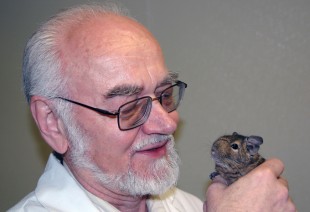
Emosjonelle følelser hos dyr / The Neuroscientific Case for Emotional Feelings in Other Animals
Den estisk fødte amerikanske psykologen og hjerneforskeren Jaak Panksepp holder foredrag på Litteraturhuset 10. juni kl. 18.00 om emosjonelle følelser hos dyr. Møtet arrangeres av Forum for bevissthetsforskning i samarbeid med Det Norske Videnskaps-Akademi.
Jaak Panksepp, Washington State University, Pullman, Washington, USA
Foredragsholder er den amerikanske hjerneforskeren Jaak Panksepp, Department of Integrative Physiology and Neuroscience, College of Veterinary Medicine, Washington State University.
Arrangører:
Møtet som arrangeres av Forum for bevissthetsforskning i samarbeid med Det Norske Videnskaps-Akademi, er åpent for alle interesserte.
Program:
18.00 - 18.05
Opening by Nils Chr. Stenseth President of the Norwegian Academy of Science and Letters
18.05 - 18.10
Introduction by Johan F. Storm, Neurophysiology, University of Oslo
18.10 - 19.10
Lecture by Jaak Panksepp, Washington State University, Pullman, Washington, USA:
"The Neuroscientific Case for Emotional Feelings in Other Animals"
19.10 - 20.00
Panel discussion and questions from the audience
About the lecturer:
JAAK PANKSEPP is an eminent pioneer in the field of affective neuroscience - the study of neural mechanisms of emotion in animals and man. We have invited him also because he represents a very interesting and original perspective in the discussion of the neural basis of consciousness. He argues for the importance of emotional feelings generated by evolutionary old parts of the brain, and that these may produce intense conscious emotional experiences in a wide range of animal species.
Whereas most neuroscientists studying consciousness focus on cognitive conscious abilities (perception, knowledge, thoughts) that are primarily generated by the cerebral cortex - in particular our "new" cortex (neocortex) that is so greatly expanded in humans and other "advanced" mammals - Panksepp argues that the "deeper" (subcortical) and evolutionary older parts of the brain may be equally important and perhaps even more fundamental for primary consciousness: our ability to experience. I have for many years been interested in this perspective, which can be considered to be complementary to the study of cortical substrates of consciousness, also because it may have serious implications for how we treat other species, and also humans with severe brain damage.
Jaak Panksepp's scientific contributions include more than 400 papers
devoted to the study of basic emotional and motivational processes
of the mammalian brain, including work on energy-balance regulation, sleep physiology, and emotional processes. He introduced the concept of Affective Neuroscience in 1990, which has guided inquiry in how mammalian brains generate experienced emotional states, as models for affective feelings in humans. This work has implications for advances in Biological Psychiatry, especially new therapeutics for depression, three of which are currently being evaluated in humans. His most recent book is
Archaeology of Mind (Norton, 2012).